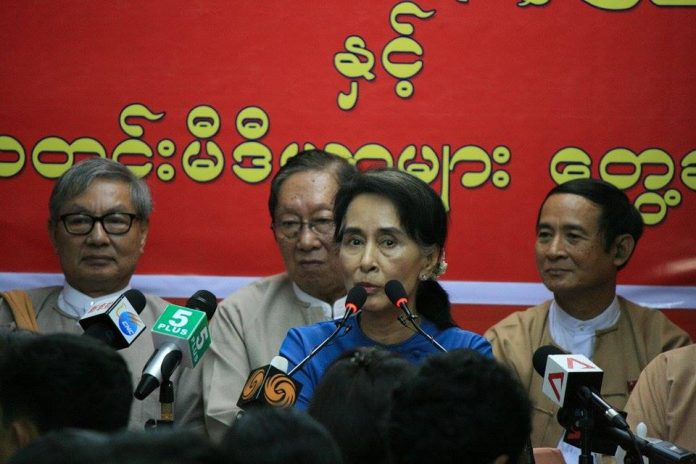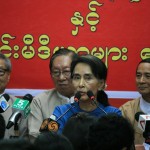“During this ceasefire talk period, the armed groups and the government army, who had been fighting before, must work on reaching agreement on some points, although they do not agree because of personal issues, or group policy,” Daw Aung San Suu Kyi said when she met with media groups at NLD headquarters in Rangoon on November 5th.
Daw Aung San Suu Kyi went on to explain that the NLD stands for national reconciliation and, although the party has not participated in the peace talk process, it was not the NLD’s choice to exclude itself from the conversation.
Both the government and ethnic armed groups must work to build trust with one another, she said, as trust-building is actually a part of the reconciliation process.
“[We] need to think widely of [the concept] of national reconciliation; it does not work to think narrowly. If we want to have a stable and developed country, the major issue that must be prioritized is that we must get along well with one another,” said Daw Aung San Suu Kyi.
In President U Thein Sein’s November 5th radio address, the President reassured the people that the government is working hard to reach a nationwide ceasefire agreement with all armed forces, highlighting the fact that, “establishing peace in the country is an essential project for our country during this democratic transition.”
In his address, the President noted that, when signing the agreement, both sides must recognize and agree to certain rules and principles, in order to reduce the breakout of fighting and counter offensives, and create a strong foundation for political talks.
“The main benefit [to agreed upon principles and rules] will be the decrease in civilian loss of life, houses, and other properties in areas when conflicts [fighting] take place,” said President U Thein Sein.
Although the President believes both sides are currently able to solve political issues through political talks, opposition leader Daw Aung San Suu Kyi states that it is not possible to consider such conclusions, as political talks have not been held yet.
Fourteen of the country’s top political leaders, including President U Thein Sein, opposition leader Daw Aung San Suu Kyi, Union Parliament Speaker Thura U Shwe Mann, Senior General Min Aung Hlaing, and Deputy Commander-in-Chief Soe Win met for two hours at the Presidential Palace in Nay Pyi Taw, on October 31st.


